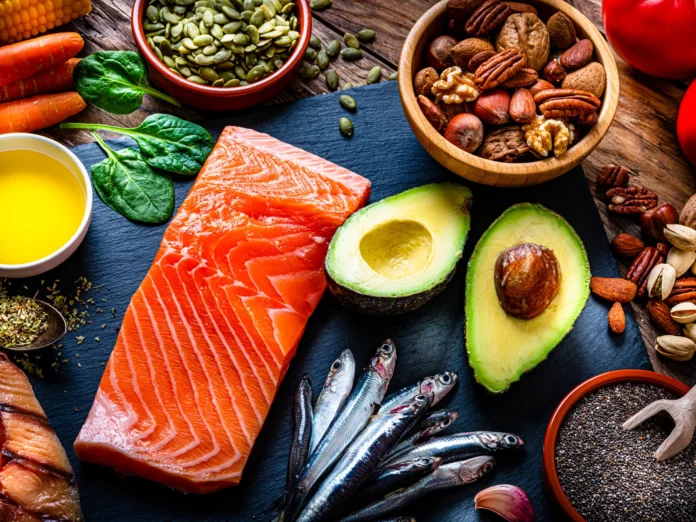Dairy products, eggs, and plants like avocados are examples of high-fat foods that are packed with vital nutrients that are good for your health. Numerous have important vitamins, fiber, and protein.
Nonetheless, the American Heart Association Trusted Source advises consuming no more than 10% of calories from saturated fat. Saturated fats in dairy products, for example, could not have the same detrimental effects as saturated fats in red meat.
However, compared to their reduced-fat or fat-free competitors, full-fat foods might have advantages. They often include fewer sugar and carbohydrates and are less processed.
These are nine extremely nutritious foods that are heavy in fat.
Avocados
Among fruits, Avocados are a fruit high in fat, while most other fruits are mainly made of carbohydrates.
In actuality, avocados contain considerably more fat than other animal foods—about 80% of their calories come from fat.
Avocados provide 15% of the Daily Value (DV) for potassium in a 5-ounce (150-gram) serving, making them one of the greatest dietary sources of potassium. They also contain a wealth of antioxidant chemicals.
Furthermore, a study comprising forty-five men and women discovered that eating one avocado every day for five weeks improved the participants’ cholesterol profiles.
They’re also a fantastic source of fiber, which has several advantages for heart health, the digestive system, and weight control.
Cheese
Despite its dubious reputation, cheese is surprisingly healthful.
In addition to having many other nutrients, it is an excellent source of calcium, vitamin B12, phosphorus, and selenium.
It’s also very high in protein; an ounce (28 grams) of cheese has 6 grams of protein, which is almost the same as a glass of milk.
Cheese and other high-fat dairy products don’t seem to raise the risk of heart disease as much as reduced-fat dairy did, according to earlier beliefs.
Dark Chocolate
Dark chocolate is a healthy snack that tastes good. It contains a lot of fat—roughly 65% of the calories from fat.
Selecting dark chocolate that contains at least 70% cocoa is crucial since other types lack the minerals and antioxidants that dark chocolate offers and have more added sugar.
Dark chocolate also includes fiber and a number of important elements that some individuals might not receive enough of, such iron and magnesium.
It is also brimming with antioxidants, including epicatechin, which may have anti-aging and performance-enhancing qualities, and resveratrol, the same antioxidant that provides red wine its health advantages.
Whole Eggs
Because of the high levels of fat and cholesterol in the yolks, whole eggs were once thought to be unhealthy.
Nonetheless, recent research indicates that, for most people, the cholesterol found in eggs does not have a detrimental effect on blood cholesterol levels.
Eggs are also rich in nutrients, including a wide range of vitamins and minerals. Choline, a nutrient necessary for the health of the brain and nerves, is one example. 50 grams (one egg) of choline give 27 percent of the Daily Value.
Eggs are another meal that helps with weight loss. Because of their high protein content, they may help you consume fewer unnecessary calories and feel filled between meals.
Eggs can be a nutritious complement to any diet, yolks and all.
Fatty Fish
Most people agree that one of the healthiest forms of animal protein is fatty fish. This comprises fish such as trout, anchovies, mackerel, sardines, herring, and salmon.
These fish are rich in high-quality proteins, heart-healthy omega-3 fatty acids, and a range of vitamins and minerals.
Research shows that regular fatty fish consumption may enhance cognitive function, help regulate blood sugar levels, and decrease heart disease risk.
If you can’t (or don’t) eat fish, taking a fish oil supplement may be useful. Cod fish liver oil is best. It contains all the omega-3s that you need, as well as plenty of vitamin D.
Nuts
Nuts are very nutritious. They are an excellent plant-based source of protein and are strong in fiber and healthy fats.
Nuts are rich in magnesium, a mineral that most people don’t get enough of, and they also include vitamin E.
Research indicates that nut eaters typically have reduced rates of obesity and heart disease.
Healthy nuts include almonds, walnuts, macadamia nuts, and numerous others.
Chia Seeds
Although an ounce (28 grams) of Chia seeds contains 11 grams of fat, chia seeds are not typically thought of as a “fatty” food.
Furthermore, the majority of the calories in chia seeds really originate from fat because almost all of their carbohydrates are fiber.
Nor are these fats just any fats. Alpha-linolenic acid (ALA), an important and heart-healthy omega-3 fatty acid, makes up the majority of the lipids in chia seeds.
Chia seeds may also have a host of other health advantages, including the potential to reduce blood pressure and have anti-inflammatory properties.
They are very nutrient-dense as well. In addition to being loaded with fiber and omega-3s, chia seeds are also packed with nutrients.
Extra virgin olive oil
Extra virgin olive oil is another fatty food that practically everyone believes is healthful. Its oleic acid content is high. A fatty acid with potent anti-inflammatory qualities, as reported by a reliable source.
The Mediterranean diet, which has been demonstrated to have several health benefits, requires this fat. Reliable Source for information on controlling blood sugar, managing weight, and heart health.
Although it may be used in a wide variety of recipes, roasted veggies and homemade salad dressings are where it truly shines.
Full-fat yogurt
Yogurt with whole milk has a lot of nutrients. It has every essential ingredient found in other dairy products with added fat.
It does, however, also contain an abundance of beneficial probiotics that can significantly improve your health.
Research indicates eating yogurt may help lower the risk of heart disease and aid in weight control in addition to improving digestive health.
Furthermore, studies indicate that full-fat dairy has no detrimental health impacts when compared to reduced- or fat-free dairy.
It’s crucial to pick whole-milk or full-fat yogurt and to go for a variety with the least amount of added sugar.
The bottom line
Research currently indicates that some fats do not provide the detrimental risks for heart health that were previously believed to exist, despite the belief that diets heavy in fat were lacking in nutrients.
Furthermore, because they are less processed, naturally high-fat meals may have comparable health benefits to those of low-fat diets.
The high-fat items on this list can readily be included in a nutrient-dense, whole-food-based diet, despite their greater calorie content.










[…] RELATED: 9-High fat foods that are excellent for your Health […]